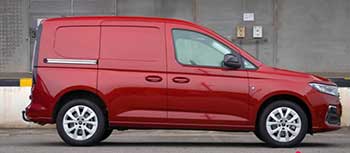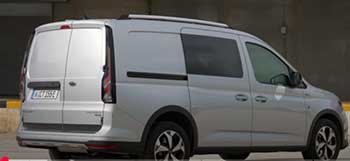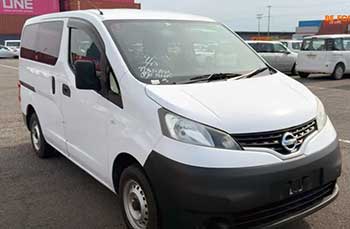
As a small business owner always on the move, I’ve spent countless hours behind the wheel of cargo vans, and I’m here to share my take on two popular compact vans: the Ford Transit Connect and the Nissan NV200.
My goal is to break down their features, performance, and practicality to help you decide which van suits your needs.
Whether you’re hauling tools, delivering packages, or converting a van for adventure, this article compares these vehicles through my real-world lens, weighing their strengths and weaknesses to guide your choice.
Comparison Table
| Feature | Ford Transit Connect | Nissan NV200 |
|---|---|---|
| Base Price (MSRP) | $35,995 | $24,805 |
| Engine | 2.0L 4-cylinder, 162 hp | 2.0L 4-cylinder, 131 hp |
| Fuel Economy | 24 MPG city / 26 MPG highway | 24 MPG city / 26 MPG highway |
| Cargo Space | 145.8 cu. ft. (long-wheelbase) | 122.7 cu. ft. |
| Seating Capacity | Up to 7 (passenger van) | 2 (cargo van only) |
| Trim Options | XL, XLT, Titanium | S, SV |
| Safety Features | Ford Co-Pilot 360, adaptive cruise | Basic cruise, rearview camera |
| Warranty | 3 years/36,000 miles | 5 years/100,000 miles |
| Customization | High (upfit-friendly, multiple configs) | Limited |
My Experience With The Ford Transit Connect
Driving the Ford Transit Connect feels like a step above the average work van. Its compact size makes it a breeze to navigate city streets, yet it offers surprising versatility. I tested both the cargo and passenger versions, and the flexibility to switch between hauling gear and carrying a crew of seven is a game-changer for businesses with varied needs.
The 2.0-liter engine, pumping out 162 horsepower, gives it a bit more pep than I expected, especially when merging onto highways. The ride is smooth, almost car-like, thanks to its unibody construction, which feels less truckish than larger vans.
The interior is where the Transit Connect shines. The dashboard layout is intuitive, with Ford’s SYNC 3 system offering a responsive touchscreen and smartphone integration. I appreciated the available tech, like wireless charging and Active Park Assist, which made parallel parking in tight urban spots less stressful.
The cargo area, especially in the long-wheelbase model, is cavernous at 145.8 cubic feet—perfect for stacking boxes or fitting tools. I once loaded it with plumbing supplies for a job, and the space, combined with the upfit-friendly design, made organization a snap.
However, it’s not all smooth sailing. The base price of $35,995 is steep compared to competitors, and the fuel economy (24 MPG city, 26 MPG highway) isn’t class-leading.
I also noticed the transmission, originally designed for smaller vehicles like the Ford Focus, can feel strained when the van is fully loaded. Still, the Transit Connect’s blend of practicality and modern features makes it a strong contender for anyone needing a versatile workhorse.
Pros Of The Ford Transit Connect

- Powerful Engine: The 2.0-liter 4-cylinder engine delivers 162 horsepower, offering better acceleration and highway performance than many compact vans.
- Spacious Cargo Area: With up to 145.8 cubic feet in the long-wheelbase model, it easily handles large loads, from tools to delivery packages.
- Versatile Configurations: Available as a cargo van or passenger wagon with up to seven seats, it adapts to various business or personal needs.
- Advanced Technology: Features like SYNC 3, wireless charging, and Ford Co-Pilot 360 (with adaptive cruise control and lane-keeping) enhance comfort and safety.
- Upfit-Friendly Design: Easy to customize with shelves, racks, or camper conversions, making it ideal for tradespeople or adventurers.
- Comfortable Ride: The unibody construction provides a car-like driving experience, reducing fatigue on long drives.
- Multiple Trim Options: XL, XLT, and Titanium trims offer flexibility for budget-conscious buyers or those wanting premium features.
The Ford Transit Connect’s strengths lie in its adaptability and modern touches. I found the cargo space unbeatable for a compact van, and the tech features made daily driving more enjoyable. Whether you’re a contractor or a small business owner, the ability to tailor this van to your needs is a huge plus.
Read more: My Thoughts on GMC Terrain Vs. Ford Escape.
Cons Of The Ford Transit Connect
- Higher Price Point: Starting at $35,995, it’s significantly more expensive than competitors like the Nissan NV200, which could strain budgets.
- Average Fuel Economy: At 24 MPG city and 26 MPG highway, it doesn’t stand out in efficiency, especially for frequent drivers.
- Transmission Concerns: The transmission, borrowed from the Ford Focus, can feel overworked when carrying heavy loads, potentially leading to wear.
- Limited Warranty: The 3-year/36,000-mile warranty is shorter than some rivals, offering less long-term peace of mind.
- Taller Driver Discomfort: While front headroom is decent, taller drivers may find the legroom and seat adjustments restrictive on long trips.
- Noisy Cabin at High Speeds: Highway driving can get loud, with noticeable road and wind noise compared to passenger cars.
- Complex Maintenance: Some repairs, like motor mount replacements, are common and can be costly if not covered by warranty.
The Transit Connect’s price tag and transmission issues are notable drawbacks. During my time with it, the cabin noise on highways was a minor annoyance, and the shorter warranty made me question long-term costs. These factors might sway budget-conscious buyers toward alternatives.
Maintenance Tips For The Ford Transit Connect
- Regular Transmission Fluid Changes: To prevent strain on the transmission, change the fluid every 30,000 miles to maintain smooth shifting.
- Monitor Motor Mounts: Check motor mounts annually, as they’re prone to wear; replacing them costs about $50 in parts and two hours of labor.
- Tire Rotations: Rotate tires every 6,000 miles to ensure even wear, especially if carrying heavy loads, to extend tire life.
- Brake System Inspections: Inspect brakes every 15,000 miles, as the van’s weight can accelerate pad and rotor wear.
- Keep Up with Oil Changes: Use synthetic oil and change it every 5,000 miles to protect the 2.0-liter engine under heavy use.
- Check Electrical Systems: Test the battery and alternator yearly, as tech-heavy features like SYNC 3 can strain the electrical system.
- Clean Cargo Area Regularly: Prevent rust and damage by cleaning the cargo floor, especially if hauling wet or dirty materials.
Maintaining the Transit Connect is straightforward but requires diligence. I learned the hard way that skipping transmission fluid changes can lead to sluggish performance. Regular checks on motor mounts and tires saved me from bigger repair bills, keeping the van reliable for daily work.
My Experience With The Nissan NV200
The Nissan NV200 is a no-frills work van that gets the job done without breaking the bank. I drove the NV200 for a week, using it for deliveries in a bustling city, and its compact footprint made parking a breeze. The 2.0-liter engine, producing 131 horsepower, felt adequate for light loads but struggled on steeper inclines or when fully loaded. Its 122.7 cubic feet of cargo space is slightly less than the Transit Connect, but I found it sufficient for most small business tasks, like carrying packages or band equipment.
The interior is spartan, with basic cloth seats and minimal tech. The standard rearview camera and Bluetooth were handy, but the lack of advanced safety features or a touchscreen felt dated. Fuel economy matches the Transit Connect at 24 MPG city and 26 MPG highway, which was decent for my urban routes. The NV200’s lower price point—starting at $24,805—makes it attractive for budget-conscious buyers, but its limited customization options and cargo-only configuration may not suit everyone.
Pros Of The Nissan NV200
- Affordable Price: Starting at $24,805, it’s one of the cheapest compact cargo vans, ideal for small businesses on a budget.
- Compact Size: Its smaller dimensions make it easy to maneuver and park in tight city environments.
- Decent Fuel Economy: Achieving 24 MPG city and 26 MPG highway, it’s cost-effective for frequent urban drivers.
- Durable Build: Known for mechanical reliability, it holds up well with proper maintenance, based on owner feedback.
- Low Maintenance Costs: Simpler design means cheaper repairs compared to tech-heavy competitors.
- Good Warranty: The 5-year/100,000-mile warranty offers better long-term coverage than the Transit Connect.
- Functional Cargo Space: With 122.7 cubic feet, it handles most small business needs, from tools to deliveries.
The NV200’s affordability and simplicity won me over for basic tasks. Its tight turning radius was a lifesaver in crowded parking lots, and the long warranty gave me confidence in its durability.
Cons Of The Nissan NV200

- Underpowered Engine: The 2.0-liter engine’s 131 horsepower feels sluggish with heavy loads or on highways.
- Limited Configurations: Only available as a cargo van with two seats, lacking the passenger versatility of competitors.
- Basic Interior: The lack of a touchscreen, minimal safety tech, and small sunvisors make the cabin feel outdated.
- Less Cargo Space: At 122.7 cubic feet, it’s outclassed by the Transit Connect’s long-wheelbase model.
- CVT Transmission Issues: The continuously variable transmission (CVT) can be costly to repair if not maintained properly.
- Minimal Customization: Limited upfit options make it less adaptable for specialized business needs.
- Lower Resale Value: Compared to Ford, the NV200 tends to depreciate faster, affecting long-term value.
The NV200’s weak engine and bare-bones interior were noticeable during my test. The CVT transmission felt odd at times, and the lack of passenger options limited its appeal for diverse needs.
Also read: My Thoughts on Ford Edge Vs. Hyundai Tucson.
Maintenance Tips For The Nissan NV200
- CVT Fluid Changes: Replace CVT fluid every 30,000 miles to avoid costly transmission repairs, as CVTs are sensitive.
- Tire Maintenance: Rotate tires every 6,000 miles and check pressure monthly, as uneven wear is common with cargo loads.
- Oil Changes: Use high-quality oil and change every 5,000 miles to keep the 2.0-liter engine running smoothly.
- Brake Checks: Inspect brakes every 15,000 miles, as city driving can wear them out faster.
- Battery Maintenance: Test the battery annually, as the NV200’s basic electrical system can be taxed by accessories.
- Cargo Area Care: Clean the cargo floor regularly to prevent corrosion, especially if transporting wet materials.
- Check Suspension: Inspect suspension components yearly, as heavy loads can strain the NV200’s setup.
Keeping the NV200 in top shape is budget-friendly if you stay proactive. I found that sticking to a strict CVT maintenance schedule was crucial to avoid the horror stories I’d read about transmission failures.
Comparison With Other Brands
- Ford Transit Connect vs. Ram ProMaster City: The ProMaster City offers a 2.4-liter engine with 178 horsepower, outpacing the Transit Connect’s 162 horsepower, but its 9-speed transmission is complex and pricier to repair. Cargo space is similar (131.7 cubic feet), but the Ram’s higher roof allows standing room, unlike the Transit Connect. Fuel economy is slightly worse at 21 MPG city/28 MPG highway, and its starting price of $33,000 is closer to the Ford’s.
- Nissan NV200 vs. Chevrolet City Express: The City Express is essentially a rebadged NV200, sharing the same 2.0-liter engine and 122.7 cubic feet of cargo space. However, Chevy’s version has slightly better interior materials but fewer dealer options since it was discontinued in 2018. Pricing was comparable at around $23,000, but the NV200’s longer warranty gives it an edge.
- Ford Transit Connect vs. Mercedes-Benz Metris: The Metris offers a premium feel with a 2.0-liter turbo engine (208 horsepower) and 183 cubic feet of cargo space, dwarfing the Transit Connect. However, its $40,000 starting price and 21 MPG city/24 MPG highway make it less economical. The Transit Connect’s compact size and lower cost appeal to smaller businesses.
- Nissan NV200 vs. Toyota Sienna (Cargo Conversion): A converted Sienna offers more passenger space but less cargo room (around 100 cubic feet) and a higher price ($36,000). Its 3.5-liter V6 (296 horsepower) is overkill for most cargo tasks, but reliability is top-notch. The NV200’s lower cost and dedicated cargo design make it more practical for work.
- Ford Transit Connect vs. Honda Odyssey (Cargo Conversion): The Odyssey, when converted, provides about 140 cubic feet of cargo space but starts at $38,000. Its 3.5-liter V6 (280 horsepower) is powerful but less fuel-efficient at 19 MPG city/28 MPG highway. The Transit Connect’s purpose-built design and lower price make it more business-friendly.
The Transit Connect stands out for its balance of cargo space and tech, while the NV200 competes on price and simplicity. Other brands like Ram or Mercedes offer unique perks but often at a higher cost or complexity.
Frequently Asked Questions (FAQ)
Ford is discontinuing the Transit Connect in the U.S. to focus on larger vans and electric vehicles, with production ending in 2023.
Nissan discontinued the NV200 in 2021 to shift toward electric vans and larger NV models, citing declining compact van demand.
The NV200 is generally reliable with proper maintenance, though CVT issues can arise if fluid changes are neglected.
The Transit Connect scores a 3/5 for reliability, with motor mounts and transmission issues being common but manageable with regular care.
Conclusion: For Ford Transit Connect And Nissan NV200
You’re now equipped with a clear picture of the Ford Transit Connect and Nissan NV200. If you need a versatile van with ample cargo space, modern tech, and the option for passenger seating, the Transit Connect is your pick—its 145.8 cubic feet of cargo and features like SYNC 3 make it a standout, despite the higher price.
If budget is your priority and you’re sticking to cargo-only tasks, the NV200’s $24,805 starting point and solid warranty are hard to beat, even with its underpowered engine. Weigh your needs, test-drive both, and choose the van that fits your hustle.

